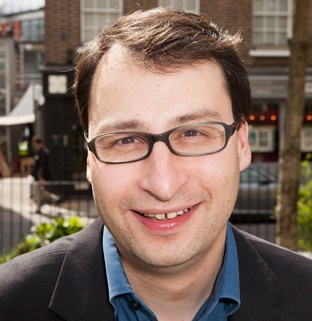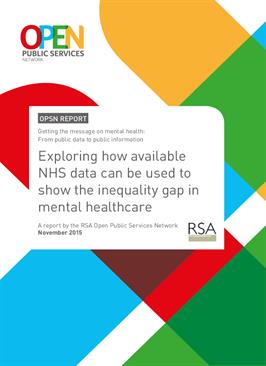In 2014, the Department of Health said in their paper ‘Closing the gap: priorities for essential change in mental health’:
We need a truer, more up-to-date and more detailed picture of mental health and wellbeing nationally and in each area.
The Open Public Services Network (OPSN) is tackling this head on with the launch of our new platform - RSA OPSN Mental Health - in association with Mind.
We believe that open access to information is vital for communities to self-organise as those empowered with the right information can more effectively demand more from their health services and act as a tool to narrow the life expectancy gap between those living with serious mental illnesses and those who aren’t.
Funded by the Cabinet Office Release of Data Fund and based within the Royal Society of Arts, RSA OPSN has mapped mental health inequalities across the UK and is working with statutory authorities to improve health outcomes by improving local accountability and ensuring civic participation.
RSA OPSN collated publically available data and worked with academic colleagues at the University of Surrey to band CCGs based on the experiences of mental health service users in their area. RSA OPSN have banded them ‘low’, ‘as expected’ and ‘high’ based on our expected outcomes adjusted for population. While these bandings provide an important basis of understanding national trends and where particular attention is required, it is important to note whether ‘as expected’, ‘low’ or ‘high’, across all indicators and all bandings, the gap between mental health service users and the rest of the population is stark and concerning.
The data we have found confirms and specifies in greater detail the differing quality as and outcome of life for those with poor mental health. We have found across the country that those with mental illnesses are more likely to die earlier and more like to get treated differently by health care professionals.
This tool has been developed alongside Mind, with mental health service users and an expert advisory panel including Geraldine Strathdee, NHS National Clinical Director for Mental Health, the Kings Fund, clinical commissioners and local practice psychotherapists and psychiatrists.
Commenting on the data, Minister for Mental Health, Alistair Burt said:
It’s really important that people with mental health conditions get access to the services they need to look after their physical health and help them to live longer, healthier lives. This site is a good example that will help ensure our NHS has high quality services across the country and inform our thinking of how to measure mental healthcare in our new CCG scorecard.
Paul Farmer, Chief Executive of Mind said:
It is shocking that people with severe mental health problems die much younger than the general population, often from preventable conditions which ought be picked up through routine testing and screening. Living a longer life shines a light on the desperate need for the physical health needs of people with mental health problems to be effectively met. It is a wake-up call for Government and local commissioners to ensure they have accurate data on health outcomes for people with mental health problems and provide the vital services and support needed for people to live a full and healthy life.
Try our interactive tool: Living a Long Life? How mental health impacts life expectancy
Find out more about the OPSN Mental Health project
pdf 2.1 MB
Contributors





